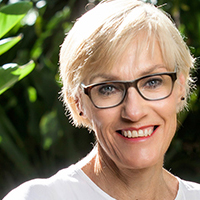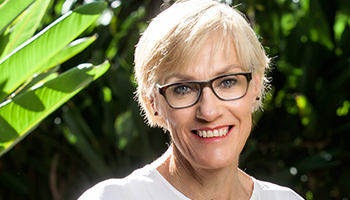
This is part of a series of articles showcasing the Sax Institute members’ diverse range of research with implications for future health policy and practice.
School of Population Health at the University of Western Australia

A strategy of involving the community in research projects from the very beginning has seen a body of research into domestic and family violence translated into action on the ground, including a successful program to help refugee communities in Australia.
Identifying and addressing the issues and barriers faced in refugee communities has been a focus of research efforts into domestic violence by the School of Population and Global Health at the University of Western Australia for the past decade.
Head of the School, Professor Colleen Fisher, said the complexities of family and domestic violence were often amplified when the abuse occurred in refugee families.
“Women from culturally and linguistically diverse backgrounds have issues in common with mainstream communities, but when you throw in experiences of torture and trauma, which are common among refugees, you get that added layer of complexity,” Professor Fisher said.
She said research conducted in five African refugee communities in Perth showed how domestic violence was influenced by factors such as experiences of torture and trauma, changes in gender and family roles, and a lack of trust in police and service providers. Broader issues like racism, unemployment and poverty also affected these communities, she said.
Sustainable program breaks down barriers for refugee families
These findings informed the development of the Healthy Relationships in African Families program – a community-driven program that aimed to educate the communities about domestic violence in an Australian context, Professor Fisher said.
“The communities wanted to make sure that when someone who had experienced domestic violence went to a community leader or a community elder, that they were being provided with appropriate information and were being referred to mainstream services when needed,” she said.
The Perth-based program was delivered to eight African refugee communities – South Sudan, Liberia, Ethiopia, Sierra Leone, Somalia, Burundi, and the Democratic Republic of Congo – over three years. In a train-the-trainer model, community leaders were trained to facilitate community conversations regarding domestic violence and support services.
Professor Fisher said the program was not only successful in improving the knowledge within these communities, it also began to break down the barriers between communities and support services.
The program concluded in 2014, but Professor Fisher said the impacts were still being felt.
“It is a sustainable intervention because that knowledge is in the communities now and the issue of domestic violence is being spoken about so much more readily than before,” she said.
Earlier this year, the School embarked on another research project to identify culturally appropriate interventions for domestic violence perpetrators from refugee backgrounds.
Setting research priorities for the broader community
“All of our research is based on the involvement of community and consumers right from the outset. If you have that involvement, there is a much better chance that your findings will be disseminated and implemented in policy and in practice,” Professor Fisher said.
This grassroots strategy has also been employed to identify research priorities for domestic violence across the broader community, she said.
Last year, the School collaborated with the Telethon Kids Institute, Kulunga Aboriginal Research Development Unit, the WA Health Translation Network’s Consumer and Community Health Research Network, Anglicare WA, Crowe Associates (UK), as well as community members with a lived experience of family and domestic violence, to arrive at 10 research priorities.
They were: law, courts and violence restraining orders; police; non-physical abuse; prevention and early intervention; impact on children; mental health issues; service delivery; inter-generational impacts; and perpetrators.
Professor Fisher said in areas where there was already a significant body of research, such as violence restraining orders, the researchers were taking on an advocacy role, while in areas where further research was needed, PhD scholarships were being established.
For example, she said one PhD project involved the researcher using data linkage to explore the impact of domestic violence on children. The researcher will draw a cohort from WA Police data, and evaluate the children’s mental health, physical health, educational and child protection outcomes.
The Sax Institute’s unique organisational structure, with 47 members from public health and health services research groups and their universities, connects us with a powerful public health network and world‑leading research expertise.
Find out more
Find out more
- Read our member profile about the Ingham Institute for Applied Medical Research: Research models the way ahead for radiotherapy services
- Learn more about our Members
- Sign up to stay up-to-date with other news from the Sax Institute
